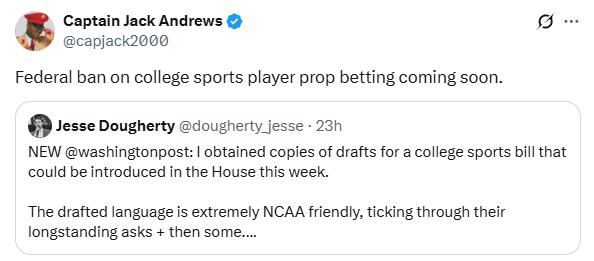Say Hello To The Bad Guy
Considering the reaction to Illinois' new per-wager fee and operator responses, people are very confused about who the bad guy is.
A reaction and overreaction to Illinois' per-wager fee; Quintenz hearing; What good RG looks like; MGC Chair talks friction and I'm here for it.
The Bulletin Board
THE LEDE: Sportsbooks react, gambling Twitter overreacts, to IL per-wager fee.
ROUNDUP: Skill game and VLT updates in PA and OH; BetRivers Poker’s three-state launch.
VIEWS: EDGE Boost’s commitment to straightforward, effective RG.
VIEWS: MGC Chair would like a little more friction.
AROUND the WATERCOOLER: Will a NIL bill lead to prop betting ban?
STRAY THOUGHTS: No surprises from Brian Quintenz.
Sponsor’s Message: Increase Operator Margins with EDGE Boost Today!
EDGE Boost is the first dedicated bank account for bettors.
Increase Cash Access: On/Offline with $250k/day debit limits
No Integration or Costs: Compatible today with all operators via VISA debit rails
Incremental Non-Gaming Revenue: Up to 1% operator rebate on transactions
Lower Costs: Increase debit throughput to reduce costs against ACH/Wallets
Eliminate Chargebacks and Disputes
Eliminate Debit Declines
Built-in Responsible Gaming tools
To learn more, contact Matthew Cullen, Chief Strategy Officer, Matthew@edgemarkets.io
The Lede: Illinois Has Caused Everyone to Lose Their Mind
Illinois’ new per-wager fee sent the gambling universe into a tizzy (read more about that here). FanDuel’s response, adding an offsetting $.50 per-wager fee in Illinois, caused everyone to lose their collective mind — DraftKings will also be making an as-of-yet unspecified change in Illinois.
No, casual bettors will not go broke, nor will they flee en masse to the black market. Illinois, et al. won’t reconsider their tax burdens, nor will other states considering tax increases remove them from the table.
The impact of the per-wager fee and FanDuel’s offsetting policy will likely be negligible for the industry. Likewise, when it comes to its ability to influence state-level policy decisions going forward.
If you’re a gambling operator in a low tax state, it’s a matter of time before the taxman comes calling. Some states will always be nicer than others, but if you think you’re safe, think again. The problem is, when you take an adversarial approach to these things, it more often than not encourages more of the same.
STTP Takeaway #1: FanDuel (and everyone else) has to do this. This is not a typical tax increase. If FanDuel didn’t pass on the cost, it would be inviting all sorts of issues with customers placing small-dollar bets. For the same reason, other operators will have to do the same (or, alternatively, set minimum bet amounts, like minimum credit card transactions). They need to disincentivize customers from placing small-dollar bets, which can overwhelm FanDuel with high-tax, low-profit wagers.
STTP Takeaway #2: FanDuel is doing the right thing by transparently showing its customers the cost and its source. Like a mom-and-pop store charging a credit card transaction fee, or a restaurant highlighting the meal tax on the receipt rather than raising menu items, transparency is always good.
STTP Takeaway #3: FanDuel is doing the state a favor; it’s assuming the role of the bad guy by telling its customers that rather than eat the higher tax, it will pass it on to them. Furthermore, with the announced $.50 per-wager fee, FanDuel could actually make money on the new tax, as the state imposes a $.25 fee on the first 20 million bets, and $.50 on all wagers after that. This margin may be small, but it gives FanDuel a buffer and tells states, ‘we have options if you impose an unsustainable tax rate.’
STTP Takeaway #4: This will have a near-zero impact on casual bettors. Casual bettors don't go broke. They don't have a bankroll that gets reduced to zero. They have jobs and dedicate a certain amount of their disposable income to betting. The only difference is that instead of betting $10 or $50 per week, they now bet $12.50 or $55.00 per week. While some bettors might cut back, the average bettor isn't going to really notice, let alone feel the added $.50 charge to each bet. If anything, it might make them more discerning about their small-dollar bets, which is likely a good thing for various reasons.
STTP Takeaway #5: We live in a world where new fees or price increases occur frequently, including streaming subscriptions, ATM fees, and delivery charges, to name a few. If they don't like it or feel the cost has become too high, they will go elsewhere, whether it's through licensed, regulated channels, the gray market, or even the black market. My streaming service charges are constantly increasing, and a couple have passed my value-add threshold, so I've cancelled them; others I keep.
Roundup: Skill Games and VLTs in PA and OH; BetRivers Poker’s Three-State Launch
Disagreement over tax rates in PA skill-game regulation bill [Covers.com]: Pennsylvania Gov. Josh Shapiro and lawmakers want to regulate skill games, but there is a divide over the specifics. Per Covers.com, “State Sen. Gene Yaw proposed a bill (SB 706) that would introduce a 16% tax… Sen. Chris Gebhard introduced SB 756, putting these games under the Pennsylvania Gaming Control Board's oversight, with a 35% tax rate.” Gov. Shapiro is aiming higher and wants to tax the machines at 52%, the same tax applied to slots in the state.
New bill in Ohio would expand VLT footprint [Cleveland.com]: Ohio has a new bill (HB 344) which could bring video lottery terminals (VLT) to retailers like bars and restaurants — VLTs are currently available at veteran and fraternal organizations. Speaking on the online casino bills in the statehouse, Cleveland.com said, “Support for such a large increase in gambling does not appear to be there, so this new bill looks to be a smaller step but still a chance to generate new revenue for education.”
BetRivers Poker goes live in three states [Pokerfuse.com]: It’s official, as reported a couple of weeks ago, BetRivers has significantly expanded its online poker footprint in the US with simultaneous launches in West Virginia, Delaware, and Michigan. As Pokerfuse’s Nick Jones noted, BetRivers is the first-ever West Virginia online poker site, returning to Delaware after an 18-month blackout, and this marks the first simultaneous launch in multiple states.
SPONSOR’S MESSAGE - Kambi is the industry’s leading independent provider of premium sports betting technology and services. Trusted by dozens of operators worldwide, each benefitting from the power of Kambi’s global network, Kambi has a proven track record of giving partners the decisive competitive edge required to grow and outperform the market.
As the home of premium sports betting solutions, Kambi offers an expansive product portfolio that caters to the evolving needs of operators and players alike. At its core is Kambi's flagship Turnkey Sportsbook, renowned for its scalability, flexibility, and unrivaled track record of delivering world-class betting experiences globally. Complementing this are Kambi’s cutting-edge standalone products: Odds Feed+, Managed Trading, Sportsbook Platform, Bet Builder, Esports, and Front End.
News: RG That Works? EDGE’s New Debit Card Feature
EDGE Boost (a newsletter sponsor) has “announced the launch of a feature that allows users to nominate trusted contacts to receive weekly reports on their gaming activity.” The “co-pilots” receive weekly reports of the user's transactions and can even participate in real-time limit adjustments.
The EDGE Boost debit card is the first debit card specifically tailored to the US gambling market (and the official debit card of the World Series of Poker), as it serves as a debit card and an Federal Deposit Insurance Corporation (FDIC)-insured bank account that lets customers seamlessly move money on and off sites, while also segregating gambling dollars from other accounts.
Per the press release, early adoption of the social accountability program “has already exceeded expectations with 7% of EDGE Boost users enabling the feature, far surpassing the industry standard of 1-2% adoption for similar, operator-based responsible gaming tools.”
EDGE CEO and Founder Seni Thomas explained the company’s vision for responsible gambling and why STTP is thrilled to have them as a sponsor:
“At EDGE, we believe in pragmatic, scalable, and effective solutions. Financial segmentation in investment, savings, and education accounts works. Anyone who engages in gaming activities should create a dedicated account for this purpose and budget their spending accordingly into a gaming account.
“In the same vein, instead of building complex RG tools, we have found that simply sending a friend a weekly transcript of their gaming activity (which is a straightforward technical build) became our most utilized RG feature.
“Another analogue for high-risk behavior is being at a bar with a buddy. You both see how much the other is drinking, and when it is time to leave, you tell your buddy to give them your keys and call an Uber. Nine times out of ten, if the bartender told you to take an Uber, you probably wouldn't.
“We aren't trying to reinvent the wheel. EDGE is simply bringing the gaming industry to parity with the financial tools you have in the rest of your life, such as being able to track and create universal limits across all legal operator types in all jurisdictions without operators needing to share data.”
Views: MGC Chair “Friction Is a Good Thing”
The US gambling industry was categorized as a “highway without speed limits” by Jordan Maynard, chair of the Massachusetts Gaming Commission, in a wide-ranging interview with Callum Jones of The Guardian.
Maynard, who joined the MGC in August 2022 and became permanent chair in the fall of 2023 following the resignation of Cathy Judd-Stein, is asking federal lawmakers to establish nationwide regulations, as current state-based lists are easily bypassed by crossing state lines. Among Maynard’s asks are advertising rules and a national exclusion list to protect problem gamblers.
Maynard pushed back on the idea of regulators and operators being partners, telling The Guardian, “I’m not thinking about big business … I’m thinking about: how does this affect the patrons and the citizens of Massachusetts?”
Maynard was also asked about the industry's no-show at a scheduled MGC roundtable on limiting bettors. “They were worried about having the conversation in public,” reflected Maynard. “My job is not to increase profits for the operators. That’s not my job. My job is to balance the equities and to cure any inequities. And so I didn’t take it personally.”
The big item (for me) was something STTP mentions a lot: The industry’s disdain for friction.
On friction, Maynard said:
“I don’t like the unregulated market being used as the boogeyman to every operator for every reason. I don’t want the legal market to race to be the illegal market. I want the illegal market to either not exist, or if it does exist, it’s in a highly competitive space with what’s regulated.”
“Some reasonable, rational friction is a good thing,” Maynard said, citing the example of weapons detectors in casinos: “I mean, listen, it created friction. And we were told by the operators that it would create friction. I think a vast majority of patrons in Massachusetts would say that friction is well worth it to ensure that no guns hit the floor of the casino.”
This is something I’ve said for several years (a few examples).
There should be friction in betting thousands of dollars on sports. At least initially. When customers increase their spending, they should encounter more friction. Friction isn’t necessarily bad.
I’d also point to the comments from Louis Rogacki, the assistant attorney general for the New Jersey Division of Gaming Enforcement, about another term the industry likes to toss around: Friction.
“The biggest dirty word for a regulator is to hear an operator say, ‘That creates friction.’ You say friction to me; the meeting’s going to end very quickly after that,” Rogacki said.
The argument isn’t landing, and the industry needs to stop doubling and tripling down on it.
Friction is my word for 2024. There is too much friction when a bettor seeks help and too little friction when they want to place wagers.
We need more friction on the entry side of the funnel - better KYC and more safeguards to keep impermissible bettors out of the ecosystem - and less friction on the exit side - withdrawal of funds, self-exclusion, and links to treatments and support.
Earlier, I said good policies shouldn’t create friction points for those seeking help. It should create significant friction points for operators and some minor annoyances for all bettors.
Here are a few examples of what I believe effective RG looks like, and those friction points are readily apparent.
In a brick & mortar setting:
ID at every point of entry…
Bet tracking and moving towards cashless gaming…
Clearly stated odds and RTP on each slot machine and game table…
At online gambling sites:
Biometric logins…
Stake limits…
Restrict VIP schemes, bonuses, and free bets…
Mandate all operators to send anonymized player data for research.
What I’d like to discuss is our preference for convenience. We want one-tap payments and are all too quick to provide sensitive information to move the process forward. But time and time again, we are discovering that information is not secure.”
Even the safest among us get burned. As much as I enjoy the convenience of one-tap payments, it feels like we need more friction points to protect us from the unscrupulous actors out there.
Online gambling seems like a good place to start. There are a number of measures that can be put in place to ensure the person making withdrawals from an account is, in fact, the person who registered the account. Give me one or two extra steps in the process, please.
SPONSOR’S MESSAGE - Underdog: the most innovative company in sports gaming.
At Underdog we use our own tech stack to create the industry’s most popular games, designing products specifically for the American sports fan.
Join us as we build the future of sports gaming.
Visit: https://underdogfantasy.com/careers
Around the Watercooler
Social media conversations, rumors, and gossip.
Per the story:
“The Washington Post obtained copies of draft legislation from two House committees that would amount to a bill that checks off every item the NCAA has spent years — and millions — lobbying for. It includes a preemption of state laws that conflict with rules set by the NCAA and/or its conferences, a prohibition on college athletes being classified as employees, and broad antitrust protection.”
STTP Thoughts: If the NCAA can sneak a sports betting restriction into federal law, this would be the opportunity, but that is far from a guarantee. The NIL policy is a much bigger deal for the NCAA, and something it wouldn’t want to blowup over college prop bets — which are already prohibited in a number of states, and something its recent Genius Sports deal also addresses.
Stray Thoughts
To borrow a line from the late Denny Green, “the Bears Brian Quintenz are who we thought they were.” When the idea of prediction markets offering sports contracts first appeared on the radar I said the cake was baked on the CFTC front, and that this will be going through the courts. My opinion hasn’t changed.
During Phase 1 of his confirmation in front of the Senate Committee on Agriculture, Nutrition, and Forestry, Brian Quintenz made it clear that he would not lift a finger to stop prediction markets from offering any and all event contracts that they see fit. While sidestepping a few questions, he made it clear that he will not be issuing any guidance on prediction markets, which means any effort to slow down the Kalshi train will have to come from the courts or Congress.
“Should I have the honor of being confirmed, I believe that I need to abide by the Commodity Exchange Act. And if there is a conflict between the Commodity Exchange Act (CEA) and the other act you mentioned [IGRA] I believe that's best resolved through Congress.”
Dustin Gouker did an excellent job breaking down the entire 1:45 hearing for those interested, but the only piece of pertinent information is that Quintenz is exactly who we thought they were, someone who believes the CEA is the end all be all. He won’t approve anything or issue guidance, because he doesn’t have to. But he won’t be asking Kalshi or anyone else to take markets down either.
So, while it might seem like there is a never-ending fountain of news on this front, this is just a slow burn of the same story until we get court rulings or congressional action.







